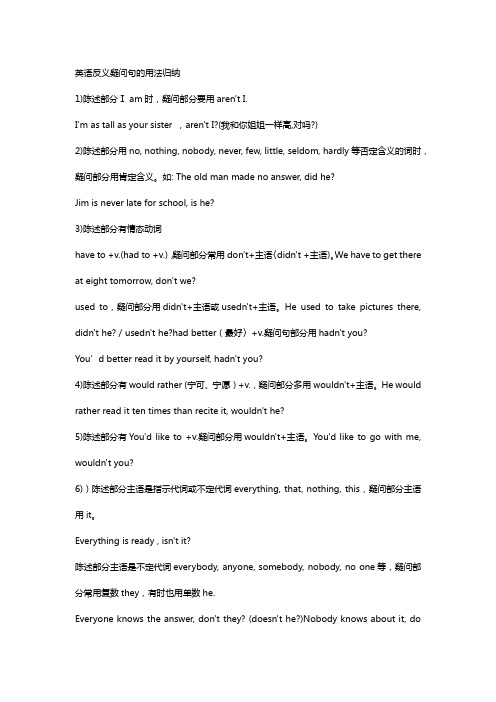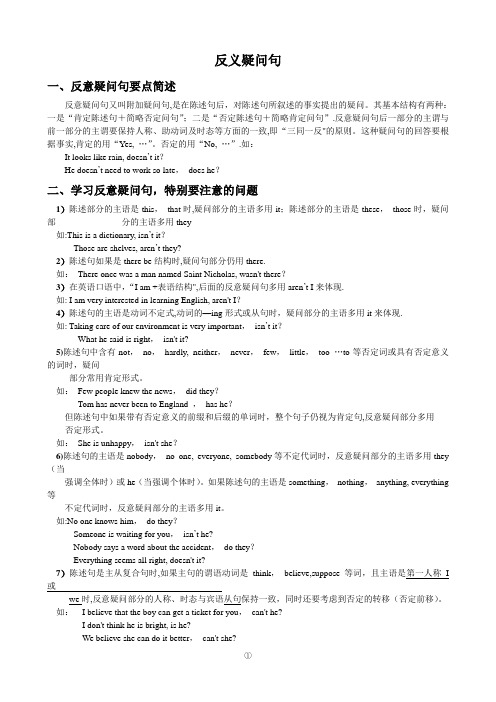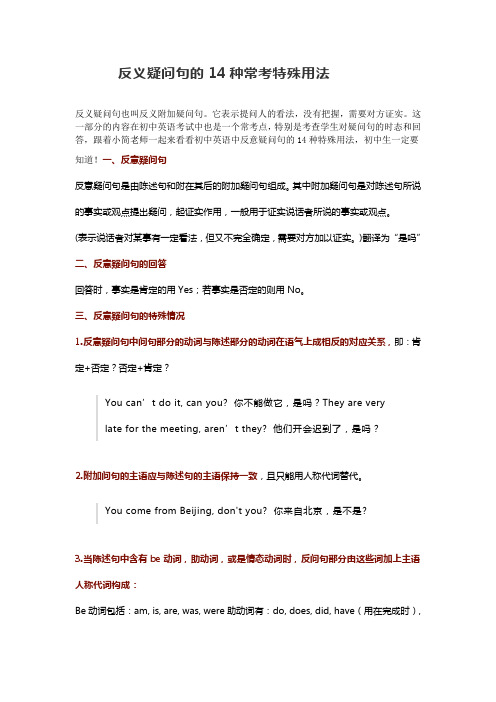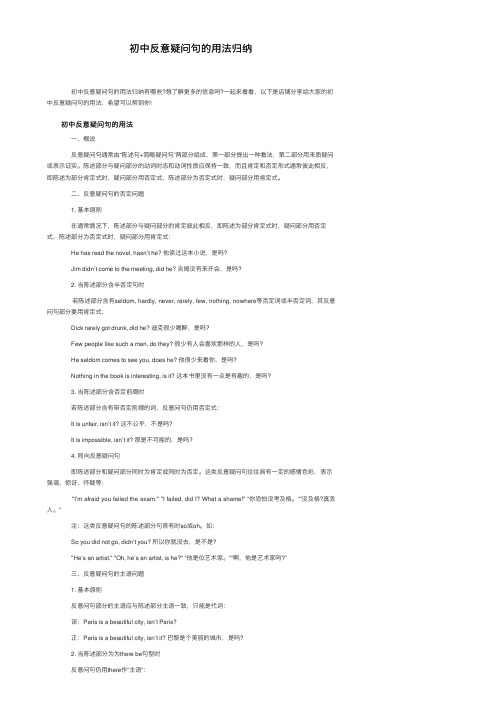初中英语反义疑问句的用法归纳
英语反义疑问句的用法归纳

英语反义疑问句的用法归纳1)陈述部分Ⅰ am时,疑问部分要用aren't I.I'm as tall as your sister ,aren't I?(我和你姐姐一样高,对吗?)2)陈述部分用no, nothing, nobody, never, few, little, seldom, hardly等否定含义的词时,疑问部分用肯定含义。
如: The old man made no answer, did he?Jim is never late for school, is he?3)陈述部分有情态动词have to +v.(had to +v.),疑问部分常用don't+主语〈didn't +主语)。
We have to get there at eight tomorrow, don't we?used to,疑问部分用didn't+主语或usedn't+主语。
He used to take pictures there, didn't he? / usedn't he?had better(最好〉+v.疑问句部分用hadn't you?You’d better read it by yourself, hadn't you?4)陈述部分有would rather (宁可、宁愿)+v.,疑问部分多用wouldn't+主语。
He would rather read it ten times than recite it, wouldn't he?5)陈述部分有You'd like to +v.疑问部分用wouldn't+主语。
You'd like to go with me, wouldn't you?6))陈述部分主语是指示代词或不定代词everything, that, nothing, this,疑问部分主语用it。
初中英语反义疑问句用法归纳.docx

反义疑问句一、反意疑问句要点简述反意疑句又叫附加疑句,是在述句后,述句所叙述的事提出的疑。
其基本构有两种:一是“肯定述句+略否定句”;二是“否定述句+略肯定句”。
反意疑句后一部分的主与前一部分的主要保持人称、助及等方面的一致,即“三同一反”的原。
种疑句的回答要根据事,肯定的用“Yes,⋯”。
否定的用“No, ⋯”。
如:It looks like rain, doesn’ t itHe doesn ’ t need to work so late, does he二、学习反意疑问句,特别要注意的问题1)述部分的主是this, that,疑部分的主多用it;述部分的主是these, those,疑部分的主多用they如: This is a dictionary, isn’ t itThose are shelves, aren 2)述句如果是there be’ t they构,疑句部分仍用there。
如: There once was a man named Saint Nicholas, wasn’ t there3)在英口中,“I am + 表构”,后面的反意疑句多用aren ’ t I来体。
如: I am very interested in learning English, aren’ t I4)述句的主是不定式,的-ing形式或从句,疑部分的主多用it来体。
如: Taking care of our environment is very important, isn’ t itWhat he said is right, isn’ t it5)述句中含有not, no, hardly, neither, never, few, little, too⋯to等否定或具有否定意的,疑部分常用肯定形式。
如: Few people knew the news, did theyTom has never been to England , has he但述句中如果有否定意的前和后的,整个句子仍肯定句,反意疑部分多用否定形式。
初中英语反义疑问句的用法归纳

反义疑问句用法小结志达学校郭玉双一.反意疑问句要点简述反意疑问句又叫附加疑问句,是在陈述句后,对陈述句所叙述的事实提出的疑问。
其基本结构有两种:一是“肯定陈述句+简略否定问句”;二是“否定陈述句+简略肯定问句”。
反意疑问句后一部分的主谓与前一部分的主谓要保持人称及助动词等方面的一致。
这种疑问句的回答要根据事实,肯定的用“Yes, …”。
否定的用“No, …”。
如:It looks like rain, doesn’t it?He doesn’t need to work so late, does he?二.学习反意疑问句,特别要注意的问题1)陈述部分的主语是this, that时,疑问部分的主语多用it;陈述部分的主语是these, those时,疑问部分的主语多用they。
如:This is a dictionary, isn’t it? /Those are books, aren’t they?2)陈述句如果是there be结构时,疑问句部分仍用there。
如:There was a river here last year, wasn’t there?3)在英语口语中,“I am +表语结构”,后面的反意疑问句多用aren’t I来体现。
如:I am very interested in learning English, aren’t I?4)陈述句的主语是动词不定式,动词的-ing形式或从句时,疑问部分的主语多用it来体现。
如:Taking care of our environment is very important, isn’t it?What he said is right, isn’t it?5)陈述句中含有not, no, hardly, neither, never, few, little, too …to等否定词或具有否定意义的词时,疑问部分常用肯定形式。
如:Few people knew the news, did they?Tom has never been to England , has he?但陈述句中如果带有否定意义的前缀和后缀的单词时,整个句子仍视为肯定句,反意疑问部分多用否定形式。
初中英语 反义疑问句的用法归纳

初一反义疑问句【反义疑问句】(一)概念:反意疑问句是由陈述句和附在其后的附加疑问句组成。
其中附加疑问句是对陈述句所说的事实或观点提出疑问,起证实作用,一般用于证实说话者所说的事实或观点。
(二)要点注意:1、反意疑问句前后两部分谓语应是:“肯定陈述+否定疑问”或“否定陈述+肯定疑问”。
2、简略问句如果是否定式:not应与be,do,will等系动词、助动词、情态动词缩写。
3、简略问句的主语不用名词,应用人称代词。
4、陈述部分含“too...to”时,是否定句。
(三)用法:1) 陈述部分I am时,疑问部分要用 aren't I.I'm as tall as your sister,aren't I (我和你姐姐一样高,对吗)2) 陈述部分用 no, nothing, nobody, never, few, little, seldom, hardly等否定含义的词时,疑问部分用肯定含义。
如: The old man made no answer, did heJim is never late for school, is he3) 陈述部分有情态动词have to +v. (had to + v.),疑问部分常用don't +主语(didn't +主语)。
We have to get there at eight tomorrow, don't weused to,疑问部分用didn't +主语或 usedn't +主语。
He used to take pictures there, didn't he / usedn't hehad better(最好) + v. 疑问句部分用hadn't youYou'd better read it by yourself, hadn't you4) 陈述部分有would rather(宁可、宁愿) +v.,疑问部分多用 wouldn't +主语。
初中英语反义疑问句用法归纳

反义疑问句一、反意疑问句要点简述反意疑问句又叫附加疑问句,是在陈述句后,对陈述句所叙述的事实提出的疑问。
其基本结构有两种:一是“肯定陈述句+简略否定问句”;二是“否定陈述句+简略肯定问句”.反意疑问句后一部分的主谓与前一部分的主谓要保持人称、助动词及时态等方面的一致,即“三同一反"的原则。
这种疑问句的回答要根据事实,肯定的用“Yes, …”。
否定的用“No, …”.如:It looks like rain, doesn’t it?He doesn’t need to work so late,does he?二、学习反意疑问句,特别要注意的问题1)陈述部分的主语是this,that时,疑问部分的主语多用it;陈述部分的主语是these,those时,疑问部分的主语多用they如:This is a dictionary, isn’t it?Those are shelves, aren’t they?2)陈述句如果是there be结构时,疑问句部分仍用there.如:There once was a man named Saint Nicholas, wasn't there?3)在英语口语中,“I am +表语结构",后面的反意疑问句多用aren’t I来体现.如: I am very interested in learning English, aren't I?4)陈述句的主语是动词不定式,动词的—ing形式或从句时,疑问部分的主语多用it来体现.如: Taking care of our environment is very important,isn’t it?What he said is right,isn't it?5)陈述句中含有not,no,hardly, neither,never,few,little,too …to等否定词或具有否定意义的词时,疑问部分常用肯定形式。
反义疑问句的14种常考特殊用法

反义疑问句的14种常考特殊用法反义疑问句也叫反义附加疑问句。
它表示提问人的看法,没有把握,需要对方证实。
这一部分的内容在初中英语考试中也是一个常考点,特别是考查学生对疑问句的时态和回答,跟着小简老师一起来看看初中英语中反意疑问句的14种特殊用法,初中生一定要知道!一、反意疑问句反意疑问句是由陈述句和附在其后的附加疑问句组成。
其中附加疑问句是对陈述句所说的事实或观点提出疑问,起证实作用,一般用于证实说话者所说的事实或观点。
(表示说话者对某事有一定看法,但又不完全确定,需要对方加以证实。
)翻译为“是吗”二、反意疑问句的回答回答时,事实是肯定的用Yes;若事实是否定的则用No。
三、反意疑问句的特殊情况1.反意疑问句中问句部分的动词与陈述部分的动词在语气上成相反的对应关系,即:肯定+否定?否定+肯定?You can’t do it, can you? 你不能做它,是吗?They are verylate for the meeting, aren’t they? 他们开会迟到了,是吗?2.附加问句的主语应与陈述句的主语保持一致,且只能用人称代词替代。
You come from Beijing, don't you? 你来自北京,是不是?3.当陈述句中含有be动词,助动词,或是情态动词时,反问句部分由这些词加上主语人称代词构成:Be动词包括:am, is, are, was, were助动词有:do, does, did, have(用在完成时),has(用在完成时)等情态动词有:can, could, may, might, must, will, would, shall, shouldHe will go home, won’t he? 他要回家了,是吗?She doesn’tlike to eat popcorn, does she? 她不喜欢吃爆米花,是吗?4.have的不同用法,反义疑问句用不同的动词(1)have 表“有”时,反义疑问句谓语动词用have/do都行He has a new car, doesn’t/hasn’t he?(2)have表“吃,喝,玩,度过,举办”等是,反义疑问句谓语动词用doHe has supper at home every day, doesn’t he?They had agood time in Beijing, didn’t they?(3)have to表“不得不,必须”时,反义疑问句谓语动词用doKite has to help her mother, doesn’t she?(4)had better表“最好”时,反义疑问句谓语动词用hadWe had better go to school at once, hadn't we?(5)have用在完成时中,反义疑问句谓语动词用haveThey have known the matter, haven’t they?5.(1)反意疑问句的陈述部分带有little, few, never, hardly, seldom,nobody, nothing, no one, none, neither等否定意义的词时,问句部分用肯定式。
初中反意疑问句的用法归纳

初中反意疑问句的⽤法归纳 初中反意疑问句的⽤法归纳有哪些?想了解更多的信息吗?⼀起来看看,以下是店铺分享给⼤家的初中反意疑问句的⽤法,希望可以帮到你! 初中反意疑问句的⽤法 ⼀、概说 反意疑问句通常由“陈述句+简略疑问句”两部分组成,第⼀部分提出⼀种看法,第⼆部分⽤来质疑问或表⽰证实。
陈述部分与疑问部分的动词时态和动词性质应保持⼀致,⽽且肯定和否定形式通常彼此相反,即陈述为部分肯定式时,疑问部分⽤否定式,陈述部分为否定式时,疑问部分⽤肯定式。
⼆、反意疑问句的否定问题 1. 基本原则 在通常情况下,陈述部分与疑问部分的肯定彼此相反,即陈述为部分肯定式时,疑问部分⽤否定式,陈述部分为否定式时,疑问部分⽤肯定式: He has read the novel, hasn’t he? 他读过这本⼩说,是吗? Jim didn’t come to the meeting, did he? 吉姆没有来开会,是吗? 2. 当陈述部分含半否定句时 若陈述部分含有seldom, hardly, never, rarely, few, nothing, nowhere等否定词或半否定词,其反意问句部分要⽤肯定式: Dick rarely got drunk, did he? 迪克很少喝醉,是吗? Few people like such a man, do they? 很少有⼈会喜欢那样的⼈,是吗? He seldom comes to see you, does he? 他很少来看你,是吗? Nothing in the book is interesting, is it? 这本书⾥没有⼀点是有趣的,是吗? 3. 当陈述部分含否定前缀时 若陈述部分含有带否定前缀的词,反意问句仍⽤否定式: It is unfair, isn’t it? 这不公平,不是吗? It is impossible, isn’t it? 那是不可能的,是吗? 4. 同向反意疑问句 即陈述部分和疑问部分同时为肯定或同时为否定。
(完整版)初中英语 反义疑问句的用法归纳

初一反义疑问句【反义疑问句】(一)概念:反意疑问句是由陈述句和附在其后的附加疑问句组成。
其中附加疑问句是对陈述句所说的事实或观点提出疑问,起证实作用,一般用于证实说话者所说的事实或观点。
(二)要点注意:1、反意疑问句前后两部分谓语应是:“肯定陈述+否定疑问”或“否定陈述+肯定疑问”。
2、简略问句如果是否定式:not应与be,do,will等系动词、助动词、情态动词缩写。
3、简略问句的主语不用名词,应用人称代词。
4、陈述部分含“too...to”时,是否定句。
(三)用法:1) 陈述部分I am时,疑问部分要用aren't I.I'm as tall as your sister,aren't I?(我和你姐姐一样高,对吗?)2) 陈述部分用no, nothing, nobody, never, few, little, seldom, hardly等否定含义的词时,疑问部分用肯定含义。
如:The old man made no answer, did he?Jim is never late for school, is he?3) 陈述部分有情态动词have to +v. (had to + v.),疑问部分常用don't +主语(didn't +主语)。
We have to get there at eight tomorrow, don't we?used to,疑问部分用didn't +主语或usedn't +主语。
He used to take pictures there, didn't he? / usedn't he?had better(最好)+ v. 疑问句部分用hadn't you?You'd better read it by yourself, hadn't you?4) 陈述部分有would rather(宁可、宁愿)+v.,疑问部分多用wouldn't +主语。
- 1、下载文档前请自行甄别文档内容的完整性,平台不提供额外的编辑、内容补充、找答案等附加服务。
- 2、"仅部分预览"的文档,不可在线预览部分如存在完整性等问题,可反馈申请退款(可完整预览的文档不适用该条件!)。
- 3、如文档侵犯您的权益,请联系客服反馈,我们会尽快为您处理(人工客服工作时间:9:00-18:30)。
反义疑问句(1)反意疑问句要点简述反意疑问句又叫附加疑问句,是在陈述句后,对陈述句所叙述的事实提出的疑问。
反意疑问句后一部分的主谓与前一部分的主谓要保持人称及助动词等方面的一致。
如:It looks like rain, doesn’t it? He doesn’t need to work so late, does he?(2)学习反意疑问句,特别要注意的问题1)陈述部分的主语是this, that时,疑问部分的主语多用it;陈述部分的主语是these, those时,疑问部分的主语多用they。
如:This is a dictionary, isn’t it? Those are shelves, aren’t they?2)陈述句如果是there be结构时,疑问句部分仍用there。
如:There once was a man named Saint Nicholas, wasn’t there?3)在英语口语中,“I am +表语结构”,后面的反意疑问句多用aren’t I来体现。
如:I am very interested in learning English, aren’t I?4)陈述句的主语是动词不定式,动词的-ing形式或从句时,疑问部分的主语多用it来体现。
如:Taking care of our environment is very important, isn’t it? What he said is right, isn’t it?5)陈述句中含有not, no, hardly, neither, never, few, little, too …to等否定词或具有否定意义的词时,疑问部分常用肯定形式。
如:Few people knew the news, did they? Tom has never been to England , has he?但陈述句中如果带有否定意义的前缀和后缀的单词时,整个句子仍视为肯定句,反意疑问部分多用否定形式。
如:She is unhappy, isn’t she?6)陈述句的主语是nobody, no one, everyone, somebody等不定代词时,反意疑问部分的主语多用they(当强调全体时)或he(当强调个体时)。
如果陈述句的主语是something, nothing, anything, everything等不定代词时,反意疑问部分的主语多用it。
如:No one knows him, do they? Someone is waiting for you, isn’t he?Nobody says a word about the accident, do they? Everything seems all right, doesn’t it?7)陈述句是主从复合句时,如果主句的谓语动词是think, believe, expect, feel, guess等词,且主语是第一人称I或we时,反意疑问部分的人称、时态与宾语从句保持一致,同时还要考虑到否定的转移(否定前移)。
如:I believe that the boy can get a ticket for you, can’t he?I don't think he is bright, is he? We believe she can do it better, can't she?若是第二第三人称的话,反义疑问句应该看主句:She thought it is meaningless,didn't she?如果是转述的要注意:He said that you were in hospital,weren't you?(这里是对着那个you说的)8)祈使句的反义疑问句中:let's 的要用shall we;let us 的要用will you;其他形式的都用will you。
如:Go and get it for me, won't you?去帮我取个东西,好吗?Let's meet at the airport, shall we ? 我们在机场碰头,行不行?Have a little more wine, will you ? 喝点儿酒,好吗?9)must的反义疑问句:陈述部分有must 的疑问句,疑问部分根据实际情况而定。
A.must表示“应该”,其疑问部分用mustn't(不应该),如:You must work hard next term, mustn't you ? 下学期你应该努力学习,对吗?B.must表示“必须”,其疑问部分用needn't(不必),如:They must finish the work today, needn’t they? 他们今天必须要完成这项工作,是吗?C.陈述部分含情态动词mustn't,表示禁止时,疑问部分就可以用must或may,如:You mustn’t stop your car here, must you? (may we?)你不能把车停在这地方,知道吗?D.must表示推测,其疑问部分必须与must 后面的主要动词相呼应。
如:对现在动作或存在的情况的推测:You must know the answer to the exercise, don't you? 你一定知道这项练习的答案,是不是?That must be your bed, isn't it? 那一定是你的床,是吗?10)have作为动词的反义疑问句:①have to 的短语,且只充当一般动词的作用,助动词为do,does,和普通的一般疑问句没有任何差别,提问还是用do,does引导。
We have to finish it ,don't we?②当用have,has做助动词的时候,疑问句才用它们引导,如:She has seen it,hasn't she?这里的助动词就是has③当陈述部分有had better,或其中的have表示完成时态时,疑问句应用hadn’t等开头:You’d better get up early, hadn’t you?④其他情况句中有have时疑问句应用don't等开头;如have表示“有”的时候,有两种形式:do或haveHe has two sisters,doesn't he? =He has two sisters,hasn't he? He doesn't have any sisters, does he?⑤当must+have done表示对过去的情况进行推测(一般句中有明确的过去时间状语),问句要根据陈述部分谓语的情况用“didn't+主语”或“wasn't/weren't+主语”;如果强调动作的完成(一般没有明确的过去时间状语),问句要用“haven't/hasn't+主语”。
She must have read the novel last week,didn't she? 她上星期一定读了这本小说,是吗?You must have told her about it, haven't you?你一定把这事告诉她了,是吗?11)带情态动词dare或need的反意疑问句,疑问部分常用need (dare ) +主语。
We need not do it again, need we ? He dare not say so, dare you?当dare, need 为实义动词时,疑问部分用助动词do + 主语。
She doesn't dare to go home alone, does she?12)感叹句中,疑问部分用be +主语。
What colours, aren't they? What a smell, isn't it?13)陈述部分由neither…nor, either…or 连接的并列主语时,疑问部分根据其实际逻辑意义而定。
Neither you nor I am engineer, are we?14)陈述部分的谓语是wish,疑问部分要用may +主语。
I wish to have a word with you, may I?15)含有ought to 的反意疑问句,陈述部分是肯定的,疑问部分用shouldn't / oughtn't +主语。
He ought to know what to do, oughtn't he? / shouldn't he?16)陈述部分的谓语是used to 时,疑问部分用didn't +主语或usedn't +主语。
He used to take pictures there, didn't he? / usedn't he?17)陈述部分有would rather +v.,疑问部分多用wouldn't +主语。
He would rather read it ten times than recite it, wouldn't he?18)陈述部分有You'd like to +v. 疑问部分用wouldn't +主语。
You'd like to go with me, wouldn't you?反意疑问句的练习1. You’d rather watch TV this evening, ______?A. isn’t itB. hadn’t youC. wouldn’t youD. won’t you2. I suppose you’re not going today, ______? A. are you B. do you C. don’t you D. aren’t you3. I wish to shake hands with you, ______? A. shall B. may I C. do I D. will I4. Three hours ought to be enough time, ______?A. oughtn’t three hoursB. didn’t theyC. shouldn’t theyD. shouldn’t three hours5. They have to study a lot, ______?A. don’t theyB. haven’t theyC. did theyD. hadn’t they6. When the car crashed, your brother escaped being hurt, ______ ?A. didn’t heB. did heC. did itD. didn’t it7. I'm sure dirty, ______? A. am I B. isn’t I C. aren’t I D. am not I8. You seem to be dissatisfied with your present post. I don’t think you judged your ability objectively when you applied for it, ______ you? A. do B. did C. don’t D. didn’t9. That’s the sort of the book you want, ______? A. is it B. isn’t that C. is that D. isn’t it10. All these dictionaries are a great help to you, ______?A. are theyB. aren’t theyC. are all these dictionariesD. aren’t all these dictionaries1. I don’t think that the necklace is made of diamond, ________?A. do IB. do youC. is n’t itD. is it2. His wife had the carpets and the curtains cleaned, ________?A. hadn’tB. hadC. didn’t sheD. did she3. It’s my son’s wedding next week, and I have to do my best for that, ____________?A. haven’t IB. don’t IC. don’t heD. isn’t it4. Harry wouldn’t become a teacher if it hadn’t been for the holiday, ____________?A. would heB. had itC. would itD. had he5. No one left here yesterday, ________?A. didn’t theyB. did theyC. didn’t oneD. did one6. Birds rarely build nests in our garden,________?A. don’t theyB. do theyC. didn’t theyD. did they7. You must have been to the Great Wall,____________?A. mustn’t youB. haven’t youC. aren’t youD. must you8. Learning how to repair motors takes a long time,________?A. doesn’t itB. don’t theyC. does itD. do they9. They must have stayed at home last night,________?A. mustn’t theyB. haven’t theyC. didn’t theyD. must they10. I feel like going to the cinema tonight,________?A. don’t IB. don’t youC. do ID. do you11. Let’s start out early tomorrow morning,________?A. shall weB. will youC. do youD. can’t you12. There’s not much news in today’s newspaper,________?A. isn’t itB. is itC. isn’t thereD. is there13. They need our help badly at the moment,________?A. needn’t theyB. need theyC. don’t theyD. do they14. She is unfit for the position,________?A. is sheB. isn’t sheC. doesn’t sheD. does she15. I wish to visit America, ________?A. don’t IB. can IC. may ID. may you16. She’s been a worker here for many yea rs,________?A. isn’t sheB. is sheC. hasn’t sheD. has she17. What beautiful flowers, ________?A. aren’t theyB. are theyC. isn’t itD. is it18. Mother used to live in a poor village, _________?A. used sheB. usedn’t sheC. didn’t heD. did he19. You’d better go at once, ________?A. wouldn’t youB. had youC. hadn’t youD. should you20. I am very interested in Mark Twain’s novels, ________?A. aren’t IB. am not IC. aren’t youD. are you1 I think they will go to town tomorrow, _____?A do IB don’t IC will theyD won’t they2 I don’t believe he can catch up with me, _____?A can heB can’t heC do ID don’t I3 I’m sure that I wi ll be well again, _____?A am IB aren’t IC will ID won’t I4 They don’t believe you are wrong, _____?A are youB aren’t youC do theyD don’t they5 We told you that he would come tonight, _______?A didn’t weB did weC would heD wouldn’t he6 The reporter said the news was not true, _________?A wasn’t itB didn’t heC did heD was it7 Your brother has lunch at home, ______?A hasn’t heB doesn’t heC has heD does he8 John has to get up early, ______?A has heB hasn’t heC does heD doesn’t he9 She has got to get everything ready, _____?A hasn’t sheB has sheC doesn’t sheD does she10 She has never been to China, _____?A has sheB hasn’t sheC doesn’t sheD does she。
